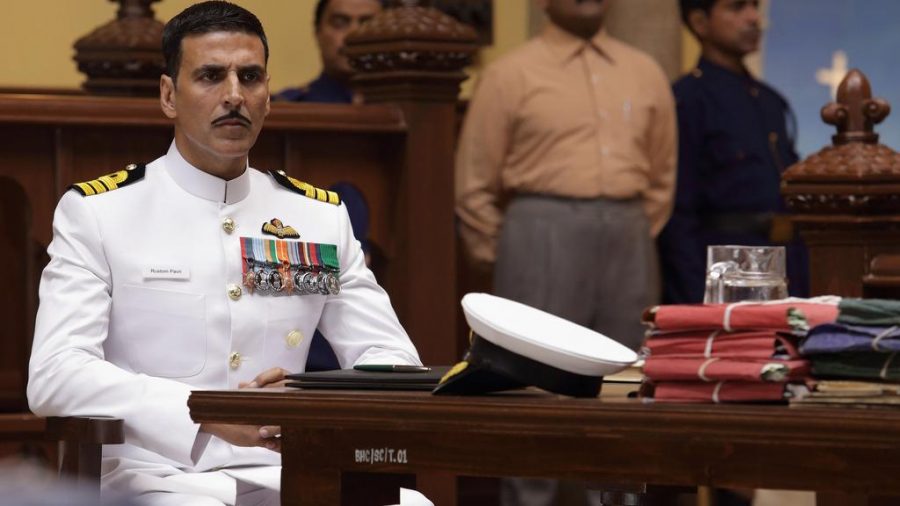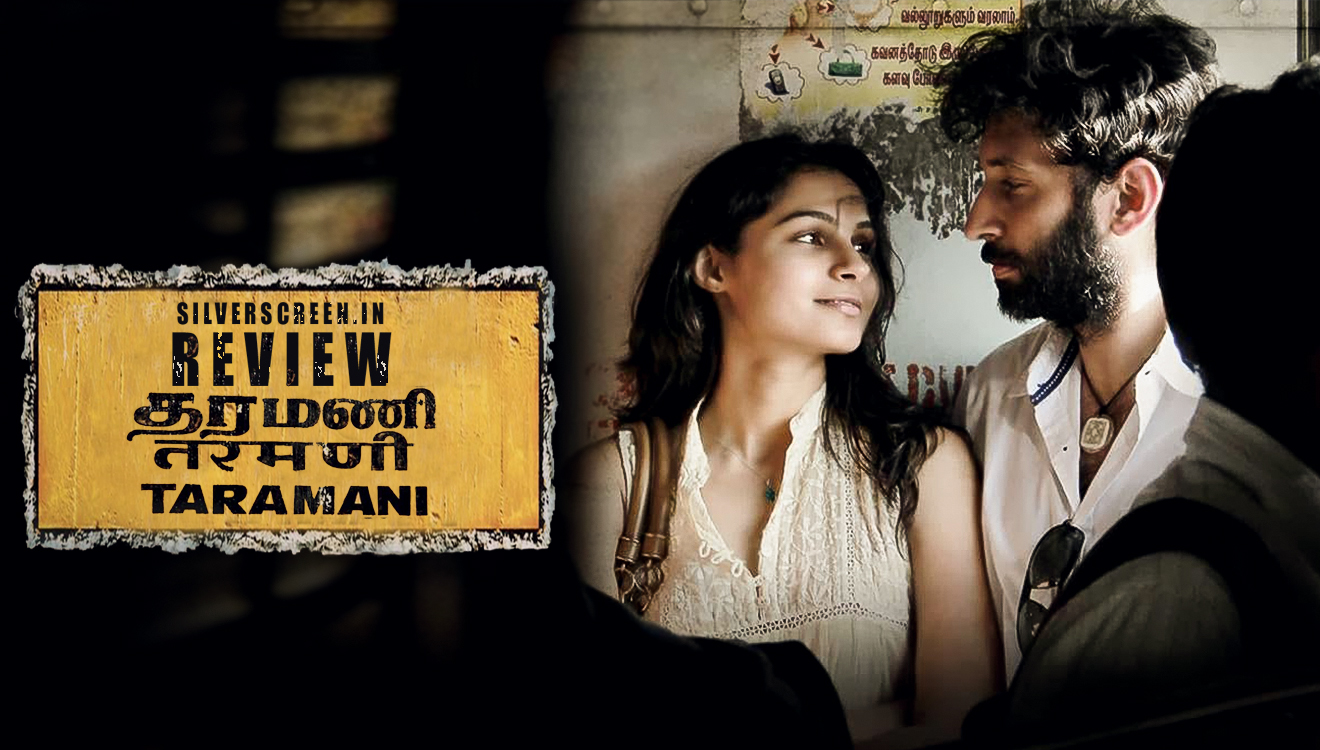In the opening scene of Akshay Kumar’s Toilet: Ek Prem Katha (2017), a group of women walks through the village lanes at the crack of dawn, lanterns and lotas (vessels holding water) in hand, towards an open field to empty their bowels. They chitchat and giggle, conversing about their in-laws, husbands and modest lifestyle. A scene that, on paper, has the potential to be a candid slice-of-life moment from rural India. However, it doesn’t happen. If the poor staging of the scene doesn’t make you cringe, the loudness of the dialogues and the performances will. In the next scene, a tractor driver passes a lewd comment at two young girls on the road, and out of nowhere, you see Jaya (Bhumi Padnekar), accompanied by the standard old-fashioned Bollywood BGM to mark tension, hurling a coconut at him.
Toilet: Ek Prem Katha, which has the subtlety of a television soap opera and the technical quality of old-fashioned public service advertising videos, released on August 11, 2017, three days before Independence Day, and became one of the top grossing films in the country last year. The film deserves to be lauded for the subject it handled. All criticism of its poor scripting and cinematic quality were lost in the high praise for the central message it tried to get across – to build toilets and support the Central Government’s flagship Swachch Bharat Mission. The film proudly advertises the tools of nation building as propagated by the Centre: Demonetisation, online shopping (eBay), Vedic texts, Sanskar (Indian culture) and Sanskriti (heritage). Exactly a year before that, Akshay Kumar’s Rustom hit the screens; he played a Navy officer who kills his wife’s lover, but walks free because the dead man was an anti-national. Rustom ends up being the public’s blue-eyed boy. The actor buttoned up his shirt, maintained a stoic expression complete with a smug smile on his face, walked around like he was taking part in an imaginary military parade, and delivered patriotism-coated dialogues like in a school play. The act won him his first National Award.
In the effort to make Indian cinema’s affair with nationalism great again, directors such as Major Ravi and actors such as Kumar are losing sight of a very important aspect – cinema is essentially art. They confidently ham up, don’t make the attempt towards achieving that ‘suspension of disbelief’, compromise on production design, and pass off badly-written dialogues, assuming the cloak of ‘in public interest’ will make them immune to criticism.
At the dawn of the millennium, Akshay Kumar was in the universe of Hera Pheri where the goofiness was irresistibly charming. The film, which narrated the misadventures of three unlikely friends played by Kumar, Suniel Shetty and Paresh Rawal, was the remake of the blockbuster Malayalam comedy Ramji Rao Speaking. Kumar fit perfectly in Hera Pheri, which is still regarded by many as one of the few better comedies Bollywood has produced. The actor spent the next decade working in no-brainers, action films and romantic dramas, several of which ended up as duds. Then came content-backed films such as Oh My God and Special 26, which cut a new road for Kumar’s 20-year-old career.
At 50, the actor is now India’s most bankable film star, and is actively involved in building a new popular genre in Indian cinema aimed at inculcating a sense patriotism in the audience. These films are slightly different from the likes of Border and LOC Kargil, which had war as background. Kumar’s films are social dramas with enormous mass appeal. They come with a pinch of comedy, romance and action, riding on the tide of nationalism that is sweeping the country of late. In a globalised world, Kumar’s films ask the audience to hold on to the idea of the nation, and emphasis on our collective identity and responsibility as the countrymen.
Kumar is aware of his new public image, and he self-consciously endorses it. Before the release of Airlift, in an interview anchored by Faridoon Shahryar, Kumar spoke of how countries such as the United States Of America splurged money on films that portrayed their country as the best. “We should have something like that. We should be supported by the Government.. narrate stories that show people what our country does, what our soldiers do,” he said.
In Gabbar Is Back, Kumar was an angry vigilante hunting down corrupt bureaucrats who hamper the nation’s development. In Holiday, he re-explored his love and admiration for the country’s defence personnel. In Airlift, the actor played an Indian businessman who selflessly takes the initiative and pulls all stops to evacuate the Indians stranded in Kuwait at the onset of Gulf war. It was followed by Rustom and Toilet Ek Prem Katha. Through Padman, he is all set to teach the country another lesson on sanitation.
Kumar’s attempts don’t go unnoticed or unrewarded. Of course, he won the National Award and joined the likes of actors such as Naseeruddin Shah, Om Puri and Mohanlal. There are several articles floating around on the Internet that list down “Patriotic Dialogues By Akshay Kumar”. During the promotional phase of Toilet Ek Prem Katha, Kumar went around Uttar Pradesh spreading awareness on sanitation. The state’s Chief Minister Yogi Adityanath not only joined the promotional events of the film, but also rendered it tax free in UP. Rumours say that Kumar’s forthcoming PadMan might be made CGST (Central Good and Services Tax) and SGST (State Goods and Services Tax)-free. In the brand commercial of Kajaria Tiles, Kumar, dressed up as an army officer, says in a sombre tone that nothing beats the tile made of the soil of one’s own country. “Desh Ki Mitti Se Bani Tiles”, he says with pride writ large on his face – Akshay Kumar holds a Canadian citizenship.
The starkest problem about these films isn’t its content or the ambiguous citizenship of the lead actor, but the lethargic making. Toilet Ek Prem Katha, directed by editor Shree Narayan Singh, is stuffed with social awareness messages, lessons and loud commentary on how India could stride ahead with the incumbent government, but meagre attention is paid on the production design, cinematography and editing. Instead of details and sensitive characterisations, we get representations and caricatures. In her review of the film, film critic Namrata Joshi notes, “If Manoj Kumar brought alive Lal Bahadur Shastri’s slogan — Jai Jawan Jai Kisan — on screen in Upkar (1967), Kumar does his bit to lend a helping hand to PM’s mission clean India 2019. But, while the former didn’t lose out entirely on creativity and imagination, here, self-conscious obsequiousness gets the better of filmmaking.”
Recommended
There is also a caste-regional coup that Kumar’s films have successfully pulled off. In the real incidents that Airlift was based on, the man who worked towards the evacuation of Indians stuck in Kuwait was a Malayali businessman named Mathunni Mathews. But in Airlift, Kumar is Katyal, an upper caste man from North India. In PadMan, he is a Chauhan, again an upper caste, from Madhya Pradesh, while A Muruganantham, the person the film is based on, is from rural Tamil Nadu, born into a family of handloom weavers.
Kumar’s forthcoming films will also remind Indians about some chapters of Indian history that they either don’t know about or respect enough. Gold, produced by Excel Entertainment, is based on the true incident of India winning the Olympic gold medal in hockey as a free nation in 1948, while Kesari, produced by Karan Johar, is based on the battle of Saragarhi, which the makers describe as one of the bravest battles fought in India.
***



